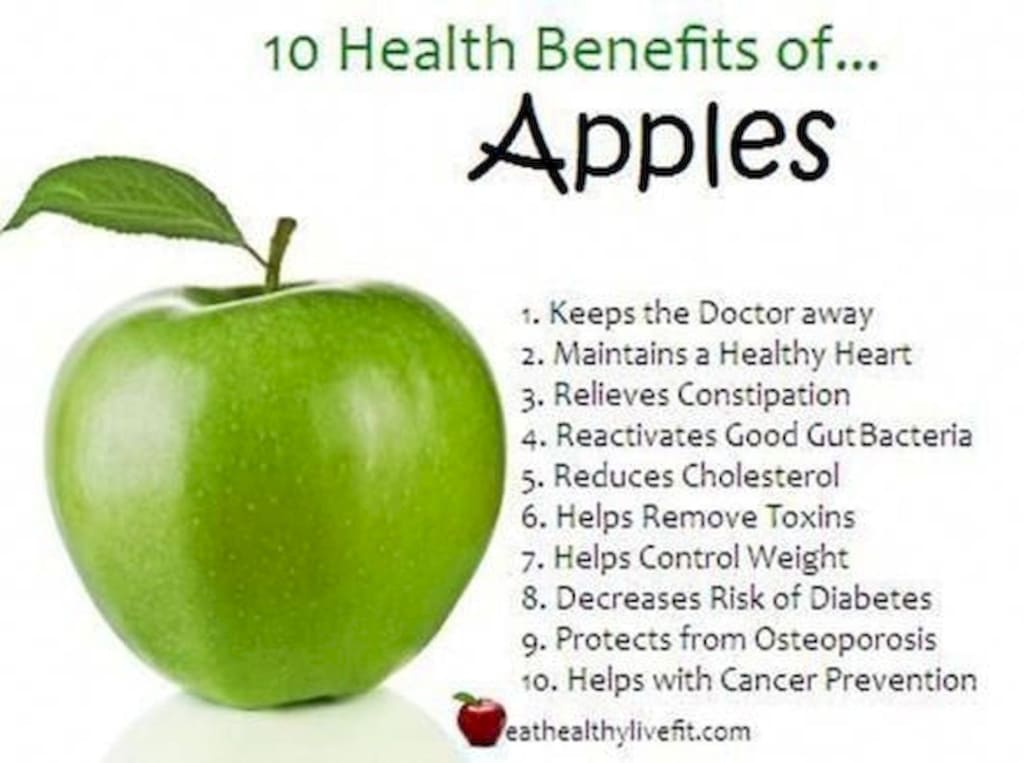Apple Eating Benefits: A Healthy Snack for a Nutritious Life
Table of content

Apple Eating Benefits: A Healthy Snack for a Nutritious Life
Table of Contents
Introduction
1.Nutritional Value of Apples
2.Antioxidant Powerhouse
3.Promotes Heart Health
4.Boosts Immunity
5.Supports Digestive Health
6.Manages Weight
7.Enhances Brain Function
8.Protects Bone Health
9.Improves Skin Health
10.Reduces the Risk of Cancer
11.Prevents Asthma
12.Regulates Blood Sugar Levels
13.Maintains Hydration
Conclusion
FAQs
Introduction
When it comes to wholesome and nutrient-rich snacks, few options can compare to the humble apple. Apples have been cherished for centuries as a versatile fruit that offers numerous health benefits. From their high vitamin and mineral content to their fiber-rich nature, apples are a convenient and delicious way to boost your overall well-being. In this article, we will explore the many benefits of eating apples and why they should be a part of your daily diet.
Nutritional Value of Apples
Apples are not only low in calories but also packed with essential nutrients. They are an excellent source of dietary fiber, vitamin C, and various antioxidants. A medium-sized apple contains approximately 95 calories, making it an ideal choice for those looking to maintain a healthy weight. Additionally, apples are rich in potassium, vitamin A, and vitamin E, all of which contribute to their health-promoting properties.
Antioxidant Powerhouse
Apples are known for their exceptional antioxidant content. Antioxidants help protect the body from harmful free radicals, which can damage cells and contribute to chronic diseases such as cancer and heart disease. The antioxidants found in apples, such as quercetin and flavonoids, have been associated with reducing inflammation and combating oxidative stress.
Promotes Heart Health
Regular consumption of apples has been linked to a reduced risk of heart disease. The soluble fiber found in apples, particularly a type called pectin, helps lower cholesterol levels by preventing the absorption of dietary cholesterol in the gut. Apples also contain polyphenols that support cardiovascular health by reducing inflammation and improving blood vessel function.
Boosts Immunity
Apples are a great source of immune-boosting nutrients. Vitamin C, present in apples, stimulates the production of white blood cells, strengthening the body's defense against infections and illnesses. Additionally, the antioxidants in apples help protect immune cells from damage, ensuring optimal immune system function.
Supports Digestive Health
The fiber content in apples promotes a healthy digestive system. The insoluble fiber adds bulk to the stool, aiding in regular bowel movements and preventing constipation. Furthermore, the soluble fiber in apples acts as a prebiotic, nourishing the beneficial bacteria in the gut and promoting a healthy gut microbiome.
Manages Weight
Incorporating apples into a balanced diet can be beneficial for weight management. The high fiber content in apples contributes to feelings of fullness, reducing overall calorie intake. Apples also have a high water content, which adds volume to the diet without adding excess calories.
Enhances Brain Function
Apples contain natural compounds that support brain health. Antioxidants found in apples help protect brain cells from oxidative stress and inflammation, potentially reducing the risk of neurodegenerative disorders like Alzheimer's disease. Additionally, studies suggest that the antioxidants in apples may improve memory and cognitive function.
Protects Bone Health
Apples contain important minerals like calcium and boron that are essential for maintaining healthy bones. These minerals contribute to bone density and strength, reducing the risk of osteoporosis and fractures. Regular apple consumption, along with a balanced diet, can support overall bone health.
Improves Skin Health
The antioxidants in apples, coupled with their hydrating properties, promote healthy and radiant skin. Apples help combat skin damage caused by free radicals, preventing premature aging signs such as wrinkles and age spots. They also contribute to skin hydration, leaving the skin supple and moisturized.
Reduces the Risk of Cancer
Several studies suggest that apple consumption may be associated with a reduced risk of certain types of cancer. The antioxidants present in apples, such as quercetin and flavonoids, possess anti-carcinogenic properties that help inhibit the growth of cancer cells and reduce inflammation in the body.
Prevents Asthma
Research indicates that apples may have a protective effect against asthma. The antioxidants and anti-inflammatory compounds found in apples help reduce airway inflammation and improve lung function. Including apples in the diet, especially for children, may contribute to a lower risk of developing asthma symptoms.
Regulates Blood Sugar Levels
Despite containing natural sugars, apples have a low glycemic index, meaning they have a minimal impact on blood sugar levels. The fiber content in apples helps slow down the absorption of sugar into the bloodstream, providing a steady release of energy. This makes apples a suitable snack option for individuals with diabetes or those aiming to manage their blood sugar levels.
Maintains Hydration
With their high water content, apples can contribute to maintaining proper hydration levels. Staying hydrated is crucial for overall health and helps ensure the optimal functioning of bodily systems. Apples offer a hydrating and refreshing snack alternative, especially during hot weather or physical activity.
Conclusion
In conclusion, apples truly live up to the adage, "An apple a day keeps the doctor away." Their remarkable nutritional profile, coupled with numerous health benefits, makes them an excellent addition to any diet. Whether you prefer them as a crunchy snack, sliced into salads, or incorporated into various recipes, apples offer a delicious and convenient way to support your overall well-being.
FAQs
Are all apple varieties equally nutritious?
While different apple varieties may have slight variations in their nutrient content, the overall nutritional value remains similar across varieties. Enjoy the apple varieties that you find most appealing and readily available.
Can apple consumption aid in weight loss?
Apples can be a valuable addition to a weight loss diet due to their high fiber content, which promotes feelings of fullness and helps control calorie intake.
Can apples replace brushing teeth?
Apples should not be considered a substitute for brushing teeth. While apples may help stimulate saliva production, they do not provide the same oral health benefits as proper dental hygiene.
Are apple peels beneficial?
Yes, apple peels are rich in antioxidants and dietary fiber. Leaving the peel intact when consuming apples provides additional health benefits.
How should apples be stored for maximum freshness?
Apples should be stored in a cool and dry place, away from other fruits. To maintain freshness, store apples in the refrigerator's crisper drawer.





Comments
There are no comments for this story
Be the first to respond and start the conversation.